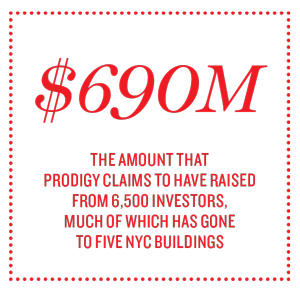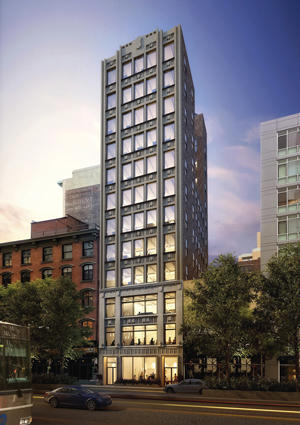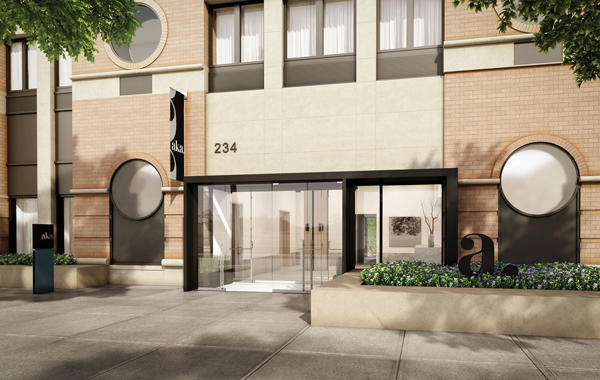In 2011, Rodrigo Niño was weighing his own mortality. The real estate executive, originally from Colombia, had been diagnosed with stage three melanoma. After two surgeries, his only choice, he later recounted in a heavily produced video, was to “venture into the unknown.”
Niño, who is tall and thin with wavy gray hair, flew to Peru and traveled into the jungle, where he spent two weeks taking ayahuasca, a traditional brew and spiritual medicine known to induce hallucinations. He said he felt his fear disappear and experienced a “field of invisible energy that binds all living things together.”
When he returned to New York — where he was running his residential brokerage — he was energized by thoughts of community and consciousness. He dropped his business model and moved into crowdfunding, an uncharted new industry that he believed was a way to democratize real estate investment. (It provides a platform for lay investors to pool their money in large commercial projects that are usually bought, sold and developed by sophisticated real estate players.)
The plan, at least for a while, seemed to be working well.
Prodigy Network claims to have raised some $690 million from 6,500 investors, much of which has gone to five New York City buildings, since it made the shift.
But more recently, the company has come under attack for poor returns, allegations of internal financial problems, a lack of transparency and a failure to make good on financial obligations to its employees. In the last few months, Niño has fired roughly 60 percent of his staff, which now hovers around 20 people. He’s also facing multiple lawsuits, including two that accuse him of using Prodigy’s cash for his own personal expenses.
Just last month, he announced that he was stepping down as CEO and a few days later revealed to investors that his cancer had returned.
Niño’s turmoil — both professionally and personally — comes at a precarious time for crowdfunding, as major players either shutter or shift their business models. It also comes at a tricky time for Prodigy, which is scrambling to get back on track and is in the midst of two developments in Chicago.
 Niño recently hired Newmark Knight Frank to assess the company’s New York portfolio and Eastdil Secured to appraise the value of one of its properties: AKA Wall Street at 84 William Street.
Niño recently hired Newmark Knight Frank to assess the company’s New York portfolio and Eastdil Secured to appraise the value of one of its properties: AKA Wall Street at 84 William Street.
A review of internal company documents as well as interviews with multiple investors suggest that Prodigy’s financial problems are vast. But during several interviews with The Real Deal, Niño argued that Prodigy’s investments would pay off in the long term.
“You basically need to wait until the disposition of the asset,” he said. “That’s when you cash out of your investment and you will know how much you’ve made or how much you’ve lost.”
His assurances appear to have done little to placate investors who have savings tied up in Prodigy buildings.
William Boulton, a Venezuelan national who put in $80,000, said he and his wife had hoped to use their investment to pay for their children’s college. “Our biggest fear is that we lose all of our money,” he said.
Early promise
Niño was one of the first adopters of crowdfunding, which took off around 2013 in the wake of a federal regulatory change. He quickly established himself as a pioneer in the space. In 2015, David Drake of LDJ Capital, a private equity firm, called Niño “the most successful real estate developer using crowdfunding in the U.S.”
Prodigy’s first acquisition in New York was a short-stay rental building: AKA Wall Street. It was purchased with Shorewood Real Estate Group and Korman Communities in 2013 for $58 million and opened its doors three years later after a gut renovation. (Korman and Shorewood did not respond to requests for comment.)
But it wasn’t until the launch of the Assemblage — a co-working venture — that the firm’s business model became intrinsically linked with its CEO’s spiritual journey. (A 2017 story in the New York Times ran under the headline “Soho House, but Make It Enlightened.”)
The first Assemblage site, which Prodigy closed on in August 2014 with capital raised through its crowdfunding platform, was 17 John Street. It featured meditation rooms, a moss-covered wall and weavings from the tribe in Peru whose ayahuasca ceremonies Niño had attended.

Prodigy later crowdfunded capital to buy another short-term rental property — AKA United Nations, at 234 East 46th Street — and two Assemblage sites in NoMad, at 114 East 25th Street and 331 Park Avenue South. It shelled out roughly $170 million for the three properties.
Prodigy also purchased a roughly 140-acre property near Woodstock, New York, known as the Sanctuary, where Assemblage members were invited to “exchange ideas around consciousness, science, philosophy and culture.”
In 2018, Prodigy attempted a different sort of capital raise: It sought to sell stakes in the company totaling $75 million, according to the marketing materials for the offering that TRD reviewed. Niño declined to say how much Prodigy raised in the offering, but the pitch pegged the value of the company at $300 million following an external valuation from boutique investment firm Violy & Company.
Later, Prodigy began marketing two developments in Chicago: a hotel called the Standard — to be operated by the chain founded by André Balazs — and a luxury residential development at 1400 North Orleans Street. (The firm still has both listed on its website as active investor opportunities.)
Prodigy projected double-digit returns at both projects.
Cracks emerge
By the end of 2018, investors had stopped receiving payments on their investments, and months later, internal discord and financial problems started coming to light.
In April of this year, Niño gathered his team at the firm’s Downtown Manhattan office to address rumors about the firm’s financial problems, according to court records.
He laid the blame on two former employees, including interim COO Vincent Mikolay, accusing them of stealing $2.5 million from the company.
However, in response, Mikolay filed a complaint accusing Niño of defamation and breach of contract, arguing that Prodigy actually owed him money from an incentive arrangement it had failed to honor.
And the industry was beginning to take note. In May, crowdfunding commentator and technology entrepreneur Ian Ippolito published a blog post claiming that some Prodigy investors had lost up to 40 percent on their investments in AKA Wall Street, and said Prodigy was asking for millions more to help pay the property’s debt. (Niño called the post a “straightforward lie.”)

331 Park Avenue South
The lawsuits kept coming. Almost two months later, Maria Alejandra Rincón — another former employee and the daughter of the vice president of Colombia — sued the company and Niño, claiming they owed her hundreds of thousands of dollars too.
Mikolay and Rincón, who were both fired, blamed the company’s financial problems on Niño’s “excessive personal distributions and expenses.” Rincón did not return messages for comment, while Mikolay and Niño both declined to comment on the lawsuits.
But in court papers seeking to dismiss Mikolay’s complaint, Niño claimed the former staffer had received $125,000 as part of his separation agreement.
Just last month, another investor, who used the name Avemar 2318 Corporation, sued Prodigy, claiming the company refused to return a $1.5 million investment. The investor claimed Prodigy was “insolvent” and alleged that the company had been using investments “for purposes other than those relating to the project.”
Avemar became concerned about its investment in the Standard hotel in Chicago when it learned that Prodigy had halted all distributions to investors at 17 John, according to the complaint.
The complaint also alleged that the company’s finances for the project didn’t add up: Prodigy’s third-party fund administrator showed only $8.7 million earmarked for the Standard project — almost $5 million less than what Prodigy had raised for it. Prodigy’s partners on the project, Joe McMillan’s DDG and Marc Realty Capital, did not return requests for comment.
One source said he invested $100,000 with Prodigy in 2014 at AKA Wall Street and made $40,000. But, he said, when he reinvested his principal and earnings in the building in 2017, his cash shrank by $90,000 (though he did receive some distributions in the interim).
“My feeling today is that those guys are going to collapse at some point and everybody is going to lose their money,” the investor said.
Niño blamed the problems at the AKA properties on stiff competition from hotels and the “shadow inventory of illegal Airbnbs.”

He said the Assemblage was still an up-and-coming brand contending with competition from co-working firms like WeWork. “The numbers are showing big improvements,” he said.
Still, in June, Prodigy blasted out letters to investors acknowledging issues at all of its properties and at the company itself, including that the firm couldn’t pay its debts. The letters also noted that payments had stopped for investors.
In August, a group of investors flew to New York to meet with Niño to discuss their investments and to work on a plan to salvage the company, according to a source who was there.
Flooded with calls from concerned investors, Prodigy set up a small response team to field their questions. But many felt Prodigy had been keeping them in the dark for too long. “Prodigy Network is known for its lack of transparency with its investors,” said one source. “It’s not a good thing when you lose money, but it’s fine as long as you’re making money.”
Niño argued that the firm provided investors with quarterly market updates, biannual investor reports on properties and newsletters through its online portal, which he claimed people often neglected to read. Furthermore, he noted that the firm has a third-party fund manager, which adds an extra layer of protection.
Prodigy has actually provided more than is federally required. The U.S. Securities and Exchange Commission doesn’t mandate crowdfunding platforms like Prodigy — which accept only accredited investors — to provide any disclosures.
“It really takes experienced investors to recognize what types of information should be provided at the outset, and what types of information should be provided after the fact on a periodic basis,” said Thomas Lee Hazen, a securities law professor at the University of North Carolina.
Back in time
For more than a decade before shifting into crowdfunding, Niño ran his company, then known as Prodigy International, as a brokerage marketing new development condos.
The firm was founded in Miami in 2003 and initially catered to Latin American buyers.
In 2007, Niño relocated to New York after the Sapir Organization contacted him to sell units at Trump Soho, the 391-unit hotel-condo it was developing with the Bayrock Group in collaboration with the Trump Organization.
Initially, Prodigy handled international buyers, while the brokerage Core worked with domestic clients. Then, in 2008, Prodigy took over all marketing.
But the project soon ran into trouble.

AKA United Nations at 234 East 46th Street
In 2010, while the New York residential market was reeling from the financial crisis, a group of buyers filed a federal lawsuit against Niño, Prodigy, the Trump Organization, Sapir and others, alleging that they had fraudulently inflated sales figures.
The lawsuit pointed to multiple interviews in which Niño and his co-defendants had allegedly misrepresented the numbers. The case was settled in November 2011, and the defendants agreed to refund 90 percent of $3.16 million in deposits without admitting any wrongdoing.
Niño downplayed his role recently. “I may have been named as a defendant in the lawsuit, but I wasn’t really part of the settlement because I was not really a party,” he said.
It was around this time that he began working on sales and marketing for one of his first crowdfunded developments, in his native Colombia. Niño said he became involved in the project, dubbed BD Bacatá, after the Spanish developer BD Promotores approached him with a pitch.
Almost 4,000 investors contributed $170 million for the mammoth 1.2 million-square-foot Bogotá development, billed as the tallest tower in Colombia. But the project also ran into financial problems. Now, eight years later, it remains only partially complete: a gloomy monolith towering over the cityscape.
Niño told TRD that Prodigy was hired as “just a sales and marketing consultant” in 2011 and left the project two years later. “I was not a principal on the building, I was not a developer of the building, it was not my building,” he said.
BD Promotores could not be reached for comment.
Prodigy’s next act
Like BD Bacatá, Prodigy is facing a host of unknowns.
For starters, it’s not clear when Niño’s resignation will take effect or who will replace him, though he said he’s committed to an orderly transition. He said his cancer is now stage four, and he’s planning to go back to the jungle in Peru.
“While the odds of survival are slim, I’m hopeful I’ll be able to heal with the support of the Assemblage community,” he said.
On the business side, Niño said he’s signed an agreement with a group of investors who have equity in the company. They’re working on a financial restructuring plan for Prodigy. That plan “will include a capital infusion,” according materials reviewed by TRD.
It’s unclear what will happen to the firm’s New York assets with Eastdil and Newmark now on board, and its Chicago deals are up in the air.
Prodigy has also made changes at the Assemblage. Most notably, it’s applied for liquor licenses at the sites — where alcohol was once shunned in favor of essences and infusions. In addition, the company is close to selling its Sanctuary retreat for $1.5 million, according to a letter to investors.
Niño insisted that the performance at the Assemblage properties was improving.
“We believe that over time, we are going to be able to achieve the required performance that we had originally conceived for the buildings,” he said. “We just need more time.”
Sitting in a meeting room at the John Street Assemblage, Niño appeared pensive as he considered what went wrong with the firm he had led for 16 years. Mistakes were made, he said. But the vision was always sound.
“I believe people should have retail access to opportunity,” he said. But he conceded: “Whether buildings deliver or not, that’s debatable.”
